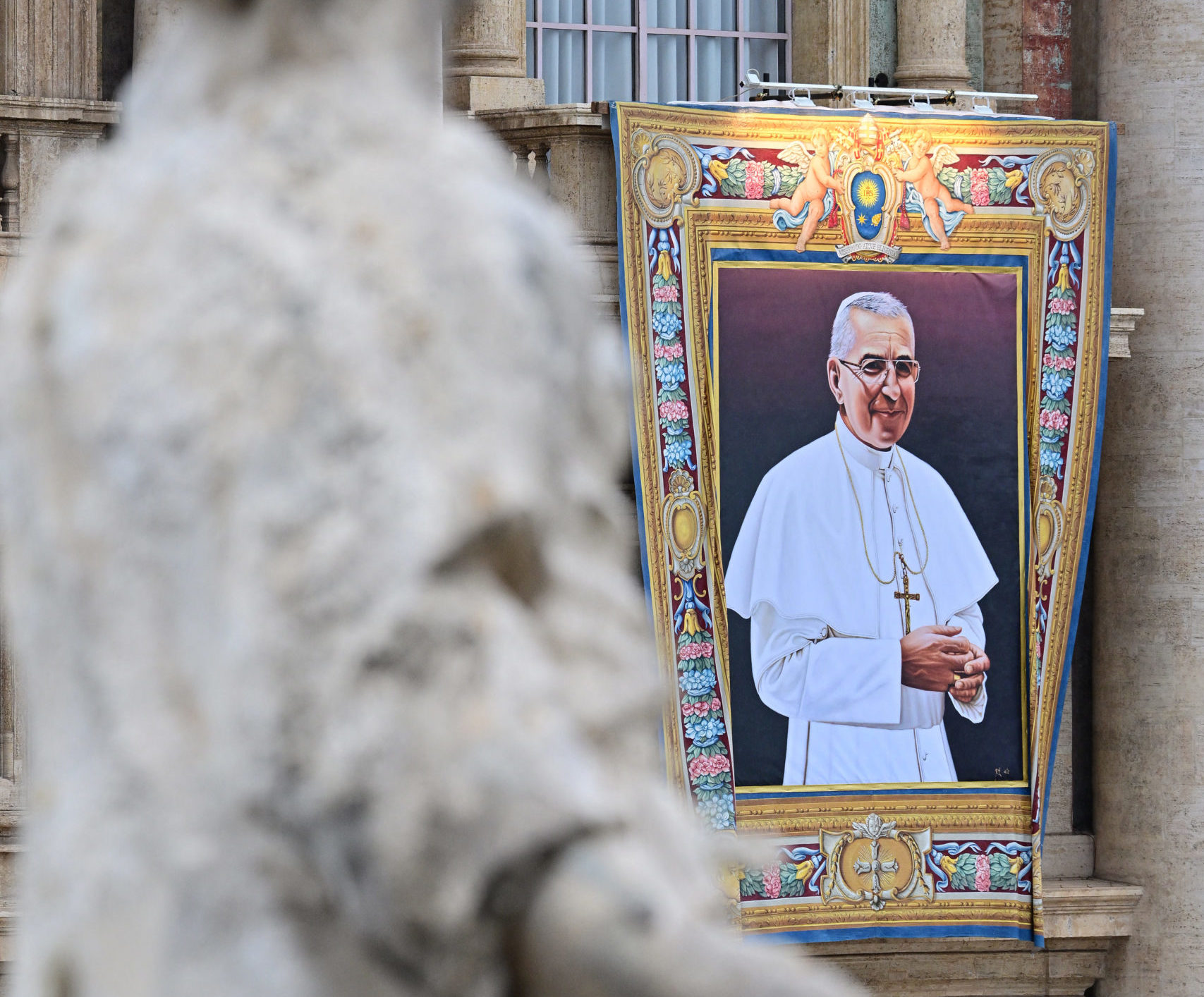
A wall hanging representing late Pope John Paul I is displayed on the facade of St. Peter’s basilica on September 4, 2022 during John Paul I’s beatification mass presided over by the Pope at St. Peter’s square in the Vatican. (Photo by Vincenzo PINTO / AFP)
VATICAN CITY — Thousands of people gathered in St Peter’s Square on Sunday as Pope Francis presided over the beatification of John Paul I, the so-called “Smiling Pope” who led the Catholic Church for just 33 days before dying in contested circumstances.
John Paul I, the son of a bricklayer from the Dolomite mountains and a particularly warm and pastoral figure, was elected pope on August 26, 1978, at the age of 65.
He died just 33 days later, on September 28, 1978, of a heart attack, making him the shortest serving pontiff in modern church history.
Pope Francis attends a mass for the beatification of Pope John Paul I, in St. Peter’s Square at the Vatican, September 4, 2022. REUTERS/Remo Casilli
A crowd of several thousand including Italian President Sergio Mattarella gathered under umbrellas through a thunderstorm to listen to the beatification mass — a step before canonization and becoming a “saint”.
“With a smile, Pope John Paul managed to communicate the goodness of the Lord,” said Pope Francis during Sunday’s Mass.
“How beautiful is a Church with a happy, serene and smiling face, that never closes doors, never hardens hearts, never complains or harbours resentment, does not grow angry or impatient, does not look dour or suffer nostalgia for the past.”
A wall hanging representing the late pope was hung on the front of St Peter’s basilica.
The death of John Paul I death sparked intense speculation as to the cause, from suicide — he seemed reluctant to take on the position of pope — to murder, allegedly by those who opposed his plans to reform the church, particularly the powerful Vatican bank.
Many have since discounted this and biographer Christophe Henning said the swirling rumours can be explained by the sudden nature of his death and the “calamitous communication” by the Vatican at the time.
No autopsy was conducted to determine the cause of death, and the Vatican issued inconsistent and false information about what happened.
For example, his lifeless body — sitting in bed, his reading glasses on his nose and typewritten documents in his hand — was found by a nun.
However, the Vatican did not want to acknowledge the presence of a woman in his bedroom, so said his secretary found him.
“For me it does not seem that there is really a doubt” about his death by natural causes, particularly given “we know that he was in fragile health”, Henning told AFP.
‘Friendly to everybody’
The Vatican announced in October 2021 that it had recognised a miracle attributed to John Paul I, allowing him to become beatified, a process when a person becomes “blessed” and the final step before becoming a saint.
The miracle was the sudden healing of a gravely ill 11-year-old girl in Buenos Aires in 2011, after a local priest prayed to the late pontiff.
Under the rules of the Catholic Church, in most cases a second miracle needs to be recognised before someone can be made a saint.
Born as Albino Luciani on October 17, 1912, in the northern Italian town of Canale d’Agordo, John Paul I rose to become Patriarch of Venice, Cardinal and then head of the Catholic Church.
The last Italian pope, he was seen as a man of consensus, of humility and simplicity and a strong sense of pastoral duty.
“Open to dialogue and listening, he gave priority to pastoral visits and direct contact with the faithful,” the Vatican said in a beatification brochure.
He defended the church’s opposition to abortion and contraception while also seeking to reform its governance.
Sister Margherita Marin, who helped John Paul I in the papal apartments, recalled a man who was “friendly to everyone.”
“He knew how to treat his colleagues with a lot of respect,” she told a Vatican press conference on Friday.
Among the most recent popes, John XXIII (1958-1963), Paul VI (1963-1978) and John Paul II (1978-2005) were proclaimed saints.
The predecessor of Pope Francis, Benedict XVI, is still alive and living in the Vatican after resigning in 2013.